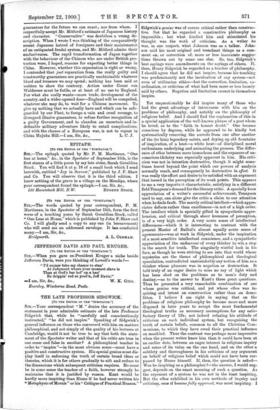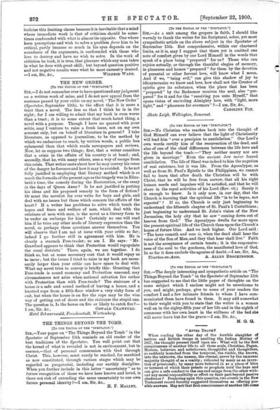THE LATE PROFESSOR SIDGWICK.
[To THE EDITOR OF THE "SPEOTATOR."] SIE,—Your correspondent " M. " denies the accuracy of the statement in your admirable estimate of the late Professor Sidgwick that, while he "carefully and conscientiously instructed," "he did not inspire." Speaking of Sidgwick's general influence on those who conversed with him on matters philosophical, and not simply of the quality of his lectures at Cambridge, would it not be true to say that both the state- ment of the Spectator writer and that of his critic are true in one sense and false in another ? A philosophical teacher in order to "inspire "—in the most obvious sense—must have a positive and constructive system. His special genius must dis- play itself in enforcing the truth of certain broad ideas or theories, which it is for others gradually to sift and reduce to the dimensions which subsequent criticism requires. He must be in some sense the teacher of a faith, however strongly he maintains that it is justified by reason. Kant would be hardly more inspiring than Hume if he had never written his 4‘ Metaphysic of Morals" or his" Critique of Practical Reason."
Sidgwick's genius was of course critical rather than construc- tive. Not that he regarded a constructive philosophy as impossible ; but what kindled him and stim.ulated his thought was the work of criticism. As a writer he was, in one respect, what Johnson was as a talker. John- son said his most original and trenchant things as a com- ment on, or correction of, more or less inaccurate sugges- tions thrown out by some one else. So, too, Sidgwick's best sayings were amendments on the sayings of others. If, then, Henry Sidgwick be regarded as a teacher of philosophy, I should agree that he did not inspire, because his teaching was predominantly not the inculcation of any system—not even of utilitarian ethics—but the correction, limitation, co- ordination, or criticism of what had been more or less loosely said by others. Negation and limitation cannot in themselves inspire.
Yet unquestionably he aid inspire many of those who had the great advantage of intercourse with him on the problems of philosophy, and notably on the philosophy of religious belief. And I should find the explanation of this in a special application of the well-known phrase of a poet whom he loved, as to the "faith in honest doubt." One became conscious by degrees, while he appeared to be kindly but systematically removing the aureole from one after another of the (to him) legendary saints, and drying up old fountains of inspiration, of a heat—a white heat—of disciplined moral enthusiasm underlying and animating the process. The differ- ence of ethos between mere iconoclasm and the exposure of un- conscious idolatry was especially apparent in him. His criti- cism was not in intention destructive, though it might some- times travel beyond the point which our powers of analysis normally reach, and consequently be destructive in effect. It was really the effort and desire to be satisfied with an argument that issued ihi the perception of its weak points. This appears to me a very important characteristic, satisfying in a different field Tennyson's demand for the literary critic. A specially keen appreciation of a writer's successful achievement, Tennyson used to say, can alone give the critic a claim to our attention when he finds fault. The merely critical intellect—which appre- ciates defects rather than excellences—is not of a high order. The intellect which is specially gifted in sympathetic appre- hension, and critical through sheer keenness of perception, is of a very high order. A very acute sense of intellectual differences—which it is interesting to contrast with the present Master of Balliors almost equally acute sense of agreements—was at work in Sidgwick, under the inspiration of a most sensitive intellectual conscience, and a sympathetic appreciation of the endeavour of every thinker to win a step in the search for truth. The singularly wistful look in his face, as though he were striving to see into that world whose mysteries are the theme of philosophical and theological speculation, contradicted unmistakably any notion of him as a thinker whose pleasure was in negation or destruction. It told truly of an eager desire to miss no ray of light which has been shed on the problems as to man's duty and destiny,—as to the answer to Kant's three great questions. Thus he presented a very remarkable combination of one whose genius was critical, and yet whose ethos was in- quiring and intent on construction rather than on demo- lition. I believe I am right in saying that on the problems of religious philosophy he became more and more disposed in later years to accept the most fundamental theological truths as necessary assumptions for any satis- factory theory of life; not indeed relaxing his attitude of criticism on each individual system, but recognising the truth of certain beliefs, common to all the Christian Corn- munions, to which they have owed their practical influence on mankind. Thus the contrast was perhaps more impressive when the present writer knew him than it could have been at an earlier date, between an eager interest in religious inquiry and sense of its value on the one hand, and on the other a subtlety and thoroughness in his criticism of any argument on behalf of religious belief which could not have been sur- passed by Hume himself. If, then, the question is asked— Was he inspiring as a philosopher ?—the answer, I would sug- gest, depends on the exact meaning of such a question. As the exponent of a system be was not in the least inspiring. But the ethos exhibited in his own methods of inquiry and criticism, once it became fully apparent, was most inspiring. I
italicise this limiting clause because it is inevitable that a mind whose immediate work is that of criticism should be some- times confounded with what is almost its opposite. One whose keen perceptions and wish to solve a problem force him to be critical, partly because so much in his eyes depends on the soundness of the arguments, is confounded with those who love to destroy and have no wish to solve. In the work of criticism he took, it is true, that pleasure which any man takes in what he does with great skill; but beyond question positive and not negative results were what he most earnestly desired.







































 Previous page
Previous page